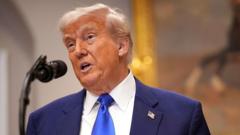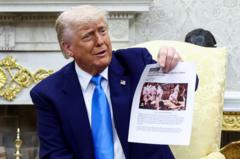As the EU reels from newly imposed tariffs by the U.S., leaders from across the continent are deliberating whether to retaliate or engage in negotiations while assessing the economic implications for key industries.**
EU's Strategic Response to Trump’s Trade Tariffs: Retaliation or Negotiation?**

EU's Strategic Response to Trump’s Trade Tariffs: Retaliation or Negotiation?**
The European Union faces a complex decision regarding its response to Donald Trump’s new tariffs that threaten various economic sectors.**
Donald Trump has ignited a firestorm in global trade with his latest tariffs announcement, prompting urgent reactions from European leaders. Germany’s outgoing Chancellor, Olaf Scholz, termed the tariffs “fundamentally wrong,” while Spain's Prime Minister Pedro Sánchez denounced them as a unilateral attack. French President Emmanuel Macron called the tariffs “brutal and unfounded,” warning of their potential to cause a severe impact on the European economy. In response, Macron convened an emergency meeting with business representatives affected by the new 20% tariffs on EU goods entering the U.S. He urged European businesses to pause investments in the U.S. until more clarity is achieved regarding the tariffs.
Prominent sectors such as French wine, champagne, aeronautics, German automobiles, and Italian luxury goods are under threat, with potential adverse effects on the chemicals, machinery, and equipment industries in the EU. Interestingly, there are also unexpected EU sectors reliant on American markets, such as French cognac, which has found a surprising niche among U.S. hip-hop stars, and Spain's gas turbines and olive oil exports.
Looking at the exposure of different EU countries, Ireland stands out due to its significant dependence on the U.S. market, particularly in pharmaceuticals and tech, making up about one-fifth of its GDP. Other nations like Luxembourg, Cyprus, and Malta also find themselves particularly vulnerable in terms of service exports, while Germany and Italy are highly exposed concerning goods exports.
In response to Trump’s tariffs, the EU’s strategy is coordinated from its headquarters in Brussels. European Commission President Ursula von der Leyen indicated that the EU holds several levers for negotiation and retaliation. The EU's single market, with its vast population of 450 million, is nearly as large as the U.S. economy in terms of GDP and could retaliate effectively without escalating tensions unnecessarily.
However, the EU's careful balancing act includes consideration of its energy ties with the U.S., particularly after pivoting away from Russian gas. Importing U.S. liquified natural gas (LNG) could make any retaliatory measures against this crucial supply politically unfeasible. EU officials aim to navigate this challenging terrain, issuing threats of retaliation while hoping for a constructive conversation with the Trump administration regarding the sudden tariffs.
Should negotiations be pursued, the EU might consider options to address the trade imbalance Trump often criticizes, such as increasing imports of U.S. goods or military equipment, yet that poses its dilemmas of conflicting EU commitments. Proposals to lower tariffs on U.S. agricultural products or regulatory measures concerning digital markets may also arise, but political and economic complexities abound in those areas.
As uncertainty looms, the European Commission contemplates the potential for a broader collapse of the international trading system, cautioning about the consequences of a trade war with China amid Trump's increasingly aggressive tariff measures. The EU continues to explore measures to reduce internal barriers within its market, aiming to enhance competitiveness and address the economic strains posed by the U.S. tariffs while mobilizing a united front against them.























